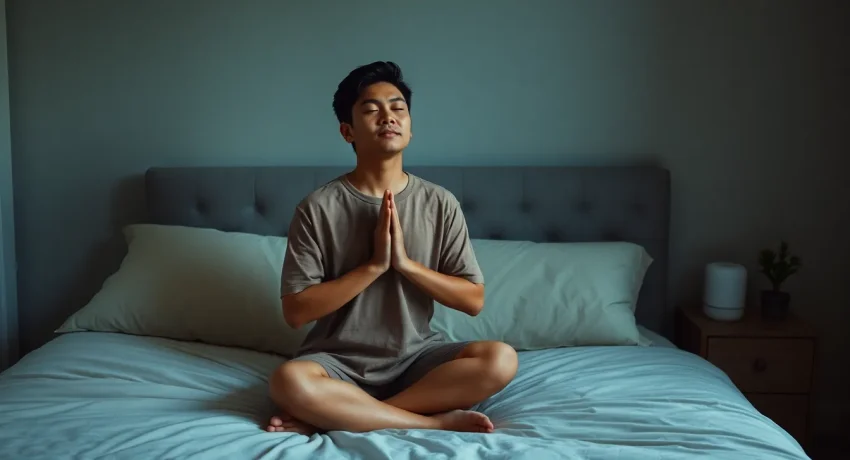Table of Contents
ToggleIn a world where counting sheep has become a nightly ritual for many, the quest for a good night’s sleep often feels like chasing a mirage. But what if the secret to sweet slumber lies not in a warm glass of milk but in the art of mindfulness? Picture this: instead of tossing and turning, you could drift off to dreamland with the calmness of a Zen master.
Mindfulness isn’t just for yogis in leggings sipping green smoothies. It’s a powerful tool anyone can harness to quiet the mind and relax the body. By incorporating mindful practices into the bedtime routine, sleep can transform from a frustrating battle into a peaceful escape. So why not trade those restless nights for some well-deserved Z’s? Let’s dive into how mindfulness can turn your sleep woes into sweet dreams.
Understanding Mindfulness
Mindfulness involves paying attention to the present moment, fostering awareness of thoughts and feelings without judgment. This practice cultivates a state of mental clarity and emotional stability that can lead to better overall well-being.
Definition of Mindfulness
Mindfulness refers to a mental practice focused on awareness and attention. Techniques often include meditation, breathing exercises, and observing the senses. Research shows mindfulness promotes relaxation and reduces anxiety, creating an effective tool for stress management. Individuals practicing mindfulness often experience heightened focus and emotional regulation. Ultimately, mindfulness encourages a deeper connection with oneself and the environment, paving the way for improved mental health.
Connection to Sleep
Mindfulness significantly influences sleep quality. Engaging in mindfulness techniques before bedtime helps calm racing thoughts and relax the body. Studies indicate that regular mindfulness practice reduces insomnia symptoms and enhances sleep duration. Additionally, focusing on breathing and body sensations alleviates tension and prevents the mind from wandering. These practices create a peaceful mindset conducive to falling asleep. Sleep becomes more restorative when individuals incorporate mindfulness into their nightly routines.
Benefits of Mindfulness for Better Sleep

Mindfulness offers significant advantages for achieving restful sleep. Integrating mindfulness practices into nightly routines can transform sleep experiences.
Reducing Anxiety and Stress
Mindfulness practices lower anxiety and stress levels effectively. Techniques such as deep breathing and meditation help individuals gather their thoughts while quieting racing minds. As awareness of one’s thoughts increases, they often find stressors less overwhelming. Attention also shifts from the worries of the day to the present moment. This shift fosters relaxation, enabling a calmer approach to bedtime. Research shows that reduced anxiety leads to improved sleep onset and fewer nighttime awakenings. Consequently, by alleviating the burden of daily stress, mindfulness contributes to a more peaceful sleep environment.
Improving Sleep Quality
Mindfulness significantly enhances sleep quality. Individuals practicing mindfulness experience deeper and more restorative sleep cycles. Engaging in mindfulness before bed allows for improved relaxation of both the mind and body. Emphasizing awareness of one’s breath or physical sensations makes it easier to release tension. Studies indicate that mindfulness decreases the severity of insomnia symptoms and lengthens sleep duration. Practitioners often report waking up feeling more refreshed and energized. Quality sleep becomes attainable through the integration of mindful practices into nightly routines.
Mindfulness Techniques for Better Sleep
Mindfulness techniques significantly enhance sleep quality and promote relaxation. Two effective methods include meditation practices and breathing exercises.
Meditation Practices
Meditation encourages awareness and relaxation before bedtime. Techniques such as guided meditation and body scan can help individuals focus on sensations in their body or visualize calming imagery. Practitioners often experience a reduction in racing thoughts and anxiety, facilitating a smoother transition to sleep. Research indicates that just 10 to 20 minutes of meditation can improve sleep quality, leading to a more restful night. Incorporating meditation into a nightly routine establishes a consistent framework for calming the mind.
Breathing Exercises
Breathing exercises promote deep relaxation and prepare the body for sleep. Simple techniques include diaphragmatic breathing and the 4-7-8 method. Focusing on slow, deep inhales and exhales helps lower heart rates and reduce tension. Engaging in these exercises for a few minutes each night can alleviate anxiety, creating an optimal environment for sleep. Studies show that controlled breathing stabilizes emotions and enhances overall well-being, further contributing to quality rest. Regular practice ensures individuals can easily access a relaxed state when bedtime approaches.
Creating a Mindfulness Routine
Establishing a mindfulness routine can greatly enhance sleep quality. Focusing on small, intentional changes sets the stage for restorative sleep.
Setting Up a Sleep Environment
Creating a calming sleep environment is crucial. Dim lighting reduces distractions, fostering a more relaxing atmosphere. Comfortable bedding encourages body relaxation, while a cool room temperature, ideally between 60°F and 67°F, promotes better sleep. Incorporating soothing scents, like lavender, can enhance relaxation. Minimizing noise with earplugs or white noise machines helps maintain focus on the present moment. An organized space free of clutter also contributes to mental clarity, allowing individuals to unwind effectively.
Incorporating Mindfulness into Your Evening Ritual
Integrating mindfulness into an evening ritual can create a sense of calm before bed. Engaging in a brief meditation session for 10 to 20 minutes prepares the mind for sleep. Exploring breathing exercises, such as the 4-7-8 method, promotes relaxation and lowers heart rates. Practicing gentle stretching or yoga can relieve physical tension accumulated throughout the day. Focusing on gratitude, by reflecting on positive experiences, nurtures a peaceful mindset. Engaging in these practices consistently helps in establishing a calming routine that signals the body it’s time for rest.
Mindfulness offers a powerful approach to achieving better sleep. By incorporating simple techniques into a nightly routine individuals can create a calming environment that promotes relaxation. Engaging in practices like meditation and breathing exercises not only quiets the mind but also prepares the body for restful slumber.
The benefits extend beyond just falling asleep; regular mindfulness practice can enhance overall sleep quality. With consistent effort and a focus on the present moment individuals can transform their sleep experience from a struggle into a peaceful ritual. Embracing mindfulness is a step towards a more restorative night’s rest and improved well-being.




